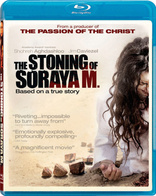The Stoning of Soraya M. Blu-ray Movie
HomeThe Stoning of Soraya M. Blu-ray Movie 
Lionsgate Films | 2008 | 115 min | Rated R | Mar 09, 2010Movie rating
7.5 | / 10 |
Blu-ray rating
| Users | 5.0 | |
| Reviewer | 3.0 | |
| Overall | 3.2 |
Overview
The Stoning of Soraya M. (2008)
In 1986 Iran, undercover French journalist Freidoune Sahebjam is traveling though a small southwestern village when his car breaks down. Surrounded by strife, he has little choice other to wait until his car is repaired and is soon approached by persistent local Zahra, who convinces him to follow her into the courtyard behind her home. There, she reveals to him that she has just bore witness to a most heinous crime - the stoning of an innocent woman who refused to divorce her husband so he could marry a younger girl. To get his way the husband accused his wife of adultery and, in order to ensure that she had no chance of defending herself, blackmailed several male villagers to testify on his behalf. A tribunal was quickly called, and her fate forever sealed.
Starring: Shohreh Aghdashloo, Mozhan Navabi, Bita Sheibani, Ali Pourtash, Parviz SayyadDirector: Cyrus Nowrasteh
| Drama | Uncertain |
| Crime | Uncertain |
Specifications
Video
Video codec: MPEG-2
Video resolution: 1080p
Aspect ratio: 2.34:1
Original aspect ratio: 2.39:1
Audio
English: Dolby Digital 5.1
Subtitles
English, English SDH
Discs
25GB Blu-ray Disc
Single disc (1 BD)
Playback
Region A, B (C untested)
Review
Rating summary
| Movie | 4.0 | |
| Video | 2.5 | |
| Audio | 2.5 | |
| Extras | 2.5 | |
| Overall | 3.0 |
The Stoning of Soraya M. Blu-ray Movie Review
The title and the film itself leave little to the imagination.
Reviewed by Dustin Somner March 31, 2010In 1994, French-Iranian journalist Freidoune Sahebjam published a book titled The Stoning of Soraya M., in which he recounted a story told to him by the aunt of a slain Iranian woman from a village he passed through. The book gained international attention among human rights organizations with a desire to eliminate the practice of executions by stoning. Two years after the book was released, Cyrus and Betsy Nowrasteh began a crusade to bring the events of the book to the big screen, and eventually bought the film rights. Betsy Nowrasteh wrote the first draft of the screenplay, since she believed she experienced a deep connection with the victim of the story (according to her comments in the audio commentary), and after several revisions, the couple had a product they felt worthy of shopping around to various producers. That role was eventually filled by Stephen McEveety (longtime collaborator with Mel Gibson), and Cyrus Nowrasteh took the helm as director. After a six week shooting schedule within a remote village, the film was released at the 2008 Toronto International Film Festival to notable acclaim. Unfortunately, the film debuted in only a handful of North American theaters throughout 2009, and never gained much traction.
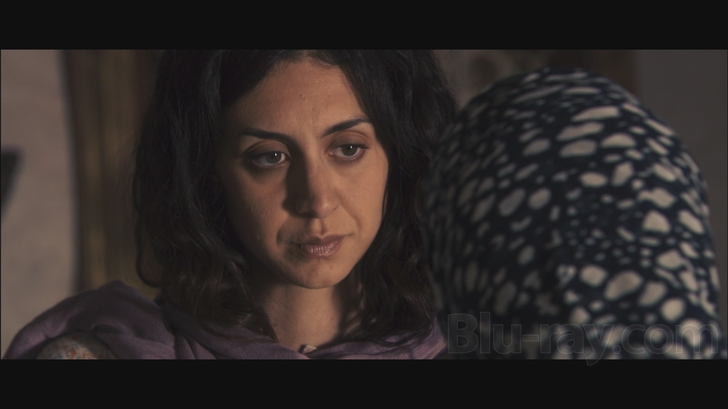
Mozhan Marno as Soraya.
Although the title says it all, this is one situation where I feel it's warranted to warn viewers about spoilers contained within the following synopsis.
While travelling through the arid countryside of Iran, journalist Freidoune Sahebjam (Jim Caviezel) becomes stranded in a small village when his car breaks down. While waiting for it to be fixed, he encounters a woman (Shohreh Aghdashloo) who insists the town is evil, and requests a moment of his time. Curious about her claims, Sahebjam reluctantly agrees to a meeting at her house and records her account of the tragic life and death of her niece, Soraya (Mozhan Marno). Going back weeks prior, we learn Soraya was married to an abusive prison guard named Ali (Navid Negahban), who views woman as possessions. After meeting a wealthy doctor within the prison, Ali strikes up a deal to marry the doctor’s 14-year-old daughter in exchange for his life (the poor doctor is sentenced to death for an unknown crime). Unfortunately, he’s unable to marry the girl until his current wife Soraya grants him a divorce. Knowing a divorce would subject her two daughters to the same horrible life she endured as a child, Soraya refuses Ali’s request and endures further beatings at his hands as a result. Meanwhile, Ali enlists the aid of the local holy man named Mullah (Ali Pourtash), who he’s blackmailing over knowledge of his prior life of crime. Together, the two men begin a campaign to convince the people of the village that Soraya has been unfaithful to her husband, knowing the consequence of the verdict will result in her death. Using hand-picked portions of Islamic Law, it soon becomes clear to Soraya and her aunt that a woman’s word holds little value in a social system ruled by men, and Soraya may face the ultimate price as a result.
As the closing credits appeared at the end of the film, I literally felt sick. In fact, I intended to begin my review immediately afterwards, but decided it might be better to let my emotions cool down in the interest of providing an objective opinion. Watching a film such as this, it’s easy to develop a knee-jerk reaction that paints a certain religion or race in an all-encompassing manner, and forget the idea that we’re dealing with bigger issues facing all of humanity. If you transplant the story of Soraya from the setting in which it’s told, you’ll begin to realize this is a tragic illustration of mob mentality, and our inability to think rationally when we suppress one side of the equation. Manipulation, greed, lust, and power are deep motivating factors behind the atrocities portrayed in the film, but the real evil is simply a rejection of justice. As a woman, how can you safely exist in a society where you’re denied basic rights? At one point in the film, the town mayor tell Soraya “If a man accuses his wife of adultery, it is up to the wife to prove her innocence, yet if a woman accuses a man of adultery, it is the woman’s responsibility to bring evidence of his guilt.” Since it’s impossible to prove your innocence in a situation that lacks evidence on either side, the males within the societal construct hold ultimate power over their counterparts. I don’t know enough about Islamic Law to suggest this is a universal concept within Iran or any other Islamic nation, but the film does present a valid argument against any system of justice that values the word of one class, race, or religion over another.
Moving past the natural emotional reaction to a story of this sort, and focusing merely on the merits of the film itself, I was quite pleased with the production. Cyrus Nowrasteh is a sure-handed director with an eye for staging intense scenes. Whether capturing the uncomfortable back-handed dealings that lead to Soraya’s eventual conviction, or demonstrating the brutality of the resulting execution, it felt as if he’d envisioned these scenes over the past decade, preparing them for an eventual transfer to film. Adding to the strengths on display, the performances throughout the film are nearly flawless, with each actor lending a healthy degree of emotional weight to their role. In many ways, the performances are so compelling that I had a difficult time remembering this is a fictional retelling of events. Whenever you have a film that’s based on real events, it helps if the cast can transport the viewer into the conflict without reminding us we’re watching actors.
As much as I was moved by the film, I feel compelled to provide a certain degree of caution to anyone interested in the story. As we know from the title of The Stoning of Soraya M., the ending is an inevitably depressing aspect of sitting through this two-hour feature. The depiction of the execution lasts far longer than I was expecting, and doesn’t hold back in showing every gruesome angle. While I wouldn’t say the violence is overly sensationalized, it does tend to overstay its welcome as time marches on. Anyone who’s experienced the brutality of The Passion of the Christ and can safely say they’re ready for round two should consider this a moving portrayal that’s well worth your time. All others should think long and hard about the strength of their stomach, and be willing to walk away if necessary (with the understanding that you won’t likely come back).
The Stoning of Soraya M. Blu-ray Movie, Video Quality 
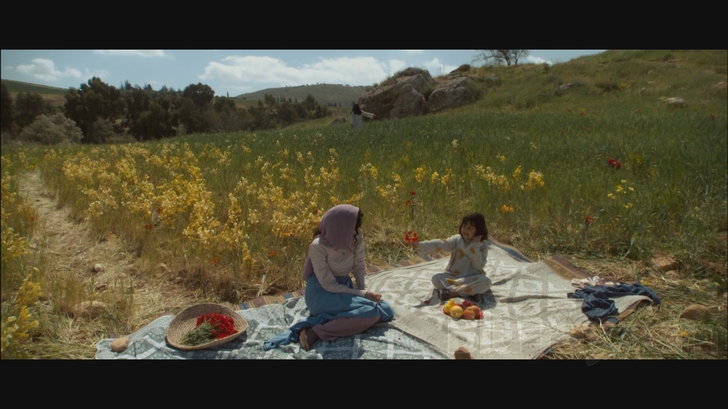
Presented in 1080p utilizing the MPEG-2 codec (at an average bitrate of 15Mbps), The Stoning of Soraya M. offers an inconsistent image that rarely appears exceptional. One of the main culprits behind my lack of enthusiasm for the transfer is subpar fine object detail, which descends into hazy territory far too often. Some of these instances appear to be related to a lack of focus in the photography itself, but there are plenty of additional moments where the image lacks crisp texturing on the surface of faces or the fabric of clothing. Don't get me wrong, this is still much better than a standard definition offering, but those hoping for a dramatic improvement in clarity might feel a bit underwhelmed. Moving along to the color palette in the film, we run into the same issues regarding wavering levels of consistency. Given the arid setting of the film, you can expect yellows and browns to dominate the spectrum, with vivid colors only appearing from time to time in the robes worn by the women. When given the chance to shine, the bright hues take on rich tones that stand out as enhanced features in the image. However, there are multiple indoor shots that reveal problematic skin tones, and shroud the entire picture in sickly yellows and greens. This could be related to lighting difficulties rather than stylistic post-processing, but whether intentional or not, the end effects is somewhat off-putting. Along the same lines, there are a handful of low-light interior and outdoor shots where the transfer displays a difficult time resolving blacks. For instance, watch the scene early in the film when Zahra leaves her house at sunrise wearing a black cloak. In that sequence there should be plenty of light to make out the ripples and folds on the cloak, but the transfer struggles to reveal any shadow detail and simply generates a large black blob.
I can't say for certain, but I'd suspect some of the inconsistencies in the transfer are related to the use of a low-bitrate MPEG-2 transfer (sometimes dipping as low as 8Mbps), but that's mere speculation on my part. No matter what the cause, this is still enough of an improvement to make it a worthy upgrade if you're a huge fan of the film.
The Stoning of Soraya M. Blu-ray Movie, Audio Quality 
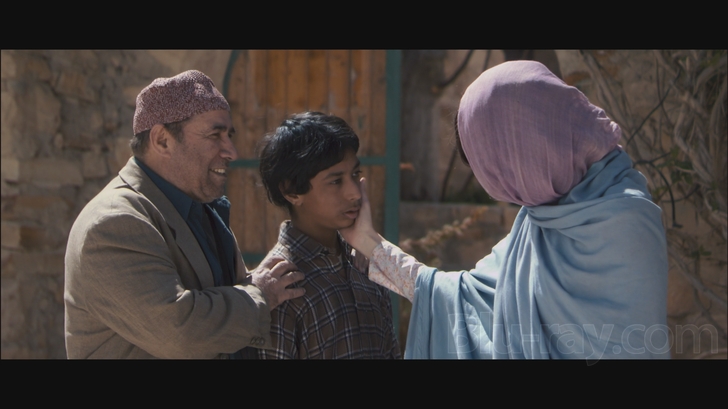
The inclusion of an out-of-date video codec made me suspect this title was originally intended for release during the early days of Blu-ray. As soon as I realized the only audio track presented on the disc is a lossy Dolby Digital 5.1 track, I'm willing to say my suspicions were confirmed. The first problem with the audio presentation is an extremely low volume level that will leave most viewers fumbling for the remote after the first two lines of dialog. Once I remedied that initial concern, I was better able to appreciate the level of clarity and balance within the mix. As most of you can tell, this isn't an action oriented film, so the majority of the sound presentation is delivered through dialog, environmental effects, and the musical score. Those three elements create an engaging experience that remains a suitable component of the tragedy that unfolds, but never generates much creativity. Surround separation is used sparingly, dialog lacks the vocal precision of a typical lossless mix, and the musical entries sound somewhat muted. As someone who's been spoiled by the improvements that accompany a lossless audio presentation, I found this experience a bit underwhelming.
The Stoning of Soraya M. Blu-ray Movie, Special Features and Extras 
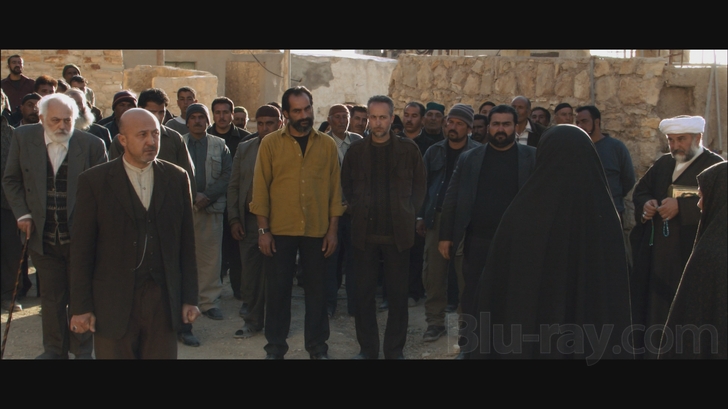
The Making of The Stoning of Soraya M.(480p, Dolby Digital 2.0, 43:03 min): Broken down into three parts (or available as a complete feature), this comprehensive documentary follows the entire production process from the adaptation of the book, to the filming of the final scenes. It's clear this was viewed as a labor of love for many of the Iranian actors and crew involved, since they hope to send a message to Iranian society and the world regarding the human rights atrocities that still take place against women. Personally, I felt the cast and crew did an excellent job balancing the desire to address their feelings on the story itself, and the experience of making the film. Those of you with an interest in prosthetics and bloody make-up effects will be extremely interested in the segment that covers the filming of the stoning sequence.
Aside from a high-definition theatrical trailer, the only other additions on the disc are two feature-length commentary tracks. The first commentary features writer/director Cyrus Nowrasteh and his wife Betsy Giffen Nowrasteh (who co-wrote the screenplay). The couple discuss the background behind adapting the book for the screen, and do an excellent job presenting more details about the cultural norms in Iran (that most western viewers may not be aware of). The second commentary track includes members of the Key Crew (Stephen A. Marinaccio II, Judy Rhee, Jane Anderson, and Sierra Robinson), who provide a more technical analysis of elements such as decorating the sets, wardrobe issues, and various steps they took to make everything appear as authentic as possible.
The Stoning of Soraya M. Blu-ray Movie, Overall Score and Recommendation 
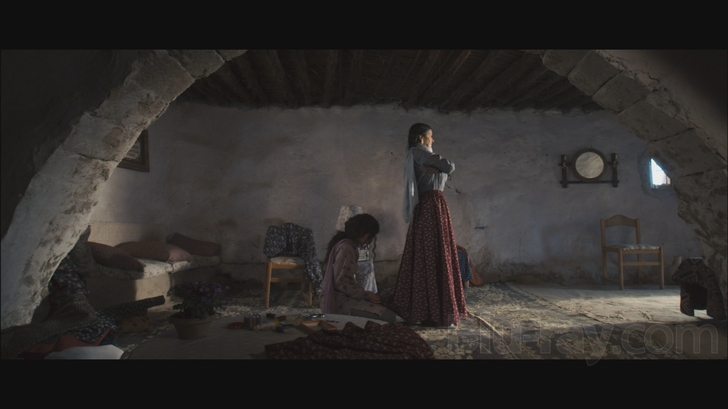
The Stoning of Soraya M. is a difficult and frustrating film that will likely scar your mind for months to come. If you don't deal well with depressing subject matter, or question your ability to cope with depictions of unjust violence toward women, this is probably a film you should avoid. For anyone else, I'd recommend you stick with a rental, and trust my opinion that you'll never want to watch it a second time.
Similar titles
Similar titles you might also like

Blackfish
2013

The Attack
2012

The Looming Tower
2018

Shock and Awe
2017

Nostalgia
2018

West of Memphis
2012

Brief Encounter
1974

Fire at Sea
Fuocoammare
2016

City of Joy
1992

God's Pocket
2014

A Quiet Passion
2016

Love Liza
2002

Manhunt: Unabomber
2017

Every Thing Will Be Fine
2015

Cameraperson
2016

Hill Street Blues: Complete Series - Seasons 1 - 7
1981-1987

Nobody Walks
2012

Enron: The Smartest Guys in the Room
2005

The Captains
2011

American Experience: Freedom Riders
2011
